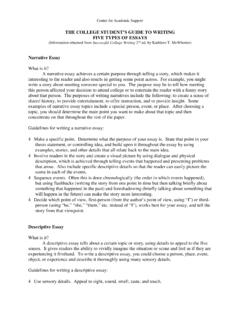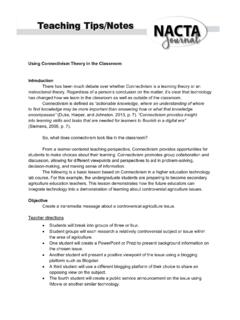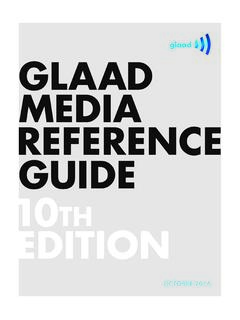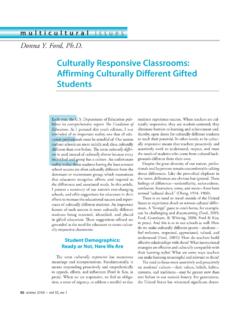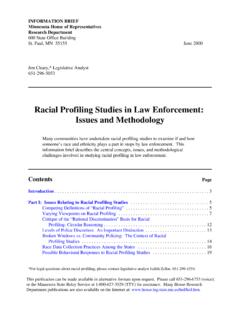Transcription of The Three Appeals of Argument Logical Appeal (logos
1 The Three Appeals of Argument Aristotle postulated Three argumentative Appeals : Logical , ethical, and emotional. Strong arguments have a balance of all of Three , though Logical (logos) is essential for a strong, valid Argument . Appeals , however, can also be misused, creating arguments that are not credible. Logical Appeal (logos) Logical Appeal is the strategic use of logic, claims, and evidence to convince an audience of a certain point. When used correctly, Logical Appeal contains the following Strong, clear claims Reasonable qualifiers for claims Warrants that are valid Clear reasons for claims Strong evidence (facts, statistics, personal experience, expert authority, interviews, observations, anecdotes) Acknowledgement of the opposition When used poorly, Logical Appeals may Over-generalized claims Reasons that are not fully explained or supported Logical fallacies Evidence misused or ignored No recognition of opposing views Ethical Appeal (ethos) Ethical Appeal is used to establish the writer as fair, open-minded, honest, and knowledgeable about the subject matter.
2 The writer creates a sense of him or herself as trustworthy and credible. When used correctly, the writer is seen Well-informed about the topic Confident in his or her position Sincere and honest Understanding of the reader's concerns and possible objections Humane and considerate When used incorrectly, the writer can be viewed Unfair or dishonest Distorting or misrepresenting information (biased) Insulting or dismissive of other viewpoints Advocating intolerant ideas Emotional Appeal (pathos) Not surprisingly, emotional Appeals target the emotions of the reader to create some kind of connection with the writer. Since humans are in many ways emotional creatures, pathos can be a very powerful strategy in Argument .
3 For this same reason, however, emotional Appeal is often to intentionally mislead readers or to hide an Argument that is weak in Logical Appeal . A lot of visual Appeal is emotional in nature (think of advertisements, with their powerful imagery, colors, fonts, and symbols). When done well, emotional Reinforce Logical arguments Use diction and imagery to create a bond with the reader in a human way Appeal to idealism, beauty, humor, nostalgia, or pity (or other emotions) in a balanced way Are presented in a fair manner When used improperly, emotional Become a substitute for logic and reason (TV and magazine advertising often relies heavily on emotional rather than Logical Appeal ) Uses stereotypes to pit one group of people against another (propaganda and some political advertising does this)
4 Offers a simple, unthinking reaction to a complex problem Takes advantage of emotions to manipulate (through fear, hate, pity, prejudice, em-barrassment, lust, or other feelings) rather than convince credibly Examples of Logos, Ethos and Pathos Logos ( Logical ) Let us begin with a simple proposition: What democracy requires is public debate, not information. Of course it needs information too, but the kind of information it needs can be generated only by vigorous popular debate. We do not know what we need to know until we ask the right questions, and we can identify the right questions only by subject-ing our ideas about the world to the test of public controversy. Information, usually seen as the precondition of debate, is better understood as its by product.
5 When we get into arguments that focus and fully engage our attention, we become avid seekers of relevant information. Otherwise, we take in information passively--if we take it in at all. Christopher Lasch, "The Lost Art of Political Argument " Ethos (Ethical) My Dear Fellow Clergymen: While confined here in Birmingham city jail, I came across your recent statement calling my present activities "unwise and untimely."..Since I feel that you are men of genuine good will and that your criticisms are sincerely set forth, I want to try to answer your statement in what I hope will be patient and reasonable in terms. I think I should indicate why I am here in Birmingham, since you have been influenced by the view which argues against "outsiders coming in.
6 "..I, along with several members of my staff, am here because I was invited here. I am here because I have organiza-tional ties here. But more basically, I am in Birmingham because injustice is here. Just as the prophets of the eighth century left their villages and carried their "thus sayith the Lord" far beyond the boundaries of their home towns, and just as the Apostle Paul left his village of Tarsus and carried the gospel of Jesus Christ to the far corners of the Greco-Roman world, so am I compelled to carry the gospel of freedom beyond my own home town. Like Paul, I must constantly respond to the Macedonian call for aid. Martin Luther King, Jr. "Letter from Birmingham Jail" Pathos (Emotional) For me, commentary on war zones at home and abroad begins and ends with personal reflections.
7 A few years ago, while watching the news in Chicago, a local news story made a personal connection with me. The report concerned a teenager who had been shot because he had angered a group of his male peers. This act of violence caused me to recapture a memory from my own adolescence because of an instructive parallel in my own life with this boy who had been shot. When I was a teenager some thirty-five years ago in the New York metropolitan area, I wrote a regular column for my high school newspaper. One week, I wrote a column in which I made fun of the fraternities in my high school. As a result, I elicited the anger of some of the most aggressive teenagers in my high school. A couple of nights later, a car pulled up in front of my house, and the angry teenagers in the car dumped garbage on the lawn of my house as an act of re-venge and intimidation.
8 James Garbarino "Children in a Violent World: A Metaphysical Perspective" Effectiveness vs. Credibility Credible (credibility) means an Argument is logically sound and well-supported with strong evidence and reasoning. Effective (effectiveness) means an Argument works in convincing or persuading its audience. Many arguments that are effective are also credible.. but there are also many that aren't. Rhetoric in its simplest form is the art of persuasive speech or writing. For thousands of years, politicians and orators have been known for their use of rhetoric to influence and persuade an audience to their side or way of thinking. One of the most famous speeches in literature is Atticus s speech in Chapter 20.
9 Atticus is able to make a great Argument on Tom Robinson s be-half enough to make the jury (and the reader) think hard about the injustices that have tran-spired. There are different ways a speaker or writer can Appeal to his or her audience: 1) logic or reason (logos), 2) emotion (pathos), and/or 3) ethics and morals (ethos). logos: by appealing to an audience s sense of reason and logic, the speaker or writer intends to make the audience think clearly about the sensible and/or obvious answer to a problem pathos: by appealing to the audiences emotions, the speaker or writer can make the au-dience feel sorrow, shame, sympathy, embarrassment, anger, excitement, and/or fear ethos: the overall Appeal of the speaker or writer himself or herself; it is important that this person have impressive credentials, a notable knowledge of the subject, and/or appear to be a likeable and moral person It is not only important what a speaker or writer has to say, but how he or she actually says or presents it.
10 There are literally hundreds of rhetorical devices, dating back to the famous orators Socrates, Plato, and Aristotle. Besides using devices you may already be familiar with, such as figures of speech (metaphor, simile, personification) and sound devices (alliteration, asso-nance, consonance), writers and speakers use many other rhetorical devices to communicate their message. Below and on the next page is a very short list of rhetorical devices, their defini-tions, and a brief example of the device in use. anaphora: repetition of a word or phrase at the beginning of successive phrases, clauses or lines, ex. "Mad world! Mad kings! Mad composition!" (King John, II, i) antithesis: opposition or juxtaposition of ideas or words in a balanced or parallel con-struction, ex.










